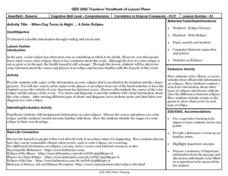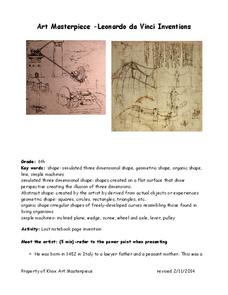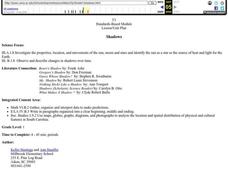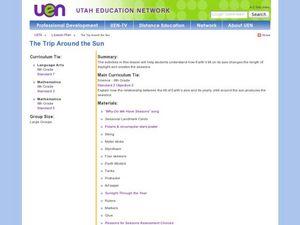Curated OER
When Day Turns to Night ... A Solar Eclipse
Students explore the causes of the phases of an eclipse and become familiar with the hazards of this event. The event once caused fear. the health hazards are researched and discussed.
Music Publishers Association of the United States
I Made It. I Own It. Please Don't Steal It.
Explore the world of copyright law with a variety of activities to instill the importance of respecting creative property. Scholars watch an animated tale then take part in a grand conversation detailing the video's main idea, details,...
Curated OER
Venus
Looking for a good instructional activity to help teach about the planet Venus? This instructional activity is for you! An excellent photograph of Venus accompanies three paragraphs of text. Learners answer five multiple choice questions...
University of Kentucky
Bullying Awareness Lessons, Activities and Resources
What are the different types of bullying? What are the impacts? What is the role of the bystander in bullying? What can be done to stop bullying? These questions are addressed by the activities included in a workshop designed for middle...
University of Kentucky
Bullying Awareness
As a teacher, it's likely you're seeing bullying at your school in some capacity. Use three activities as a refresher course for junior high schoolers on what bullying is, the severity of its consequences, and how they can make a...
Digital History
The Boston Massacre
What better way to get your class interested in history than to embody important historical characters and make events come to life? Stage a realistic mock trial of the British soldiers accused of murdering five Bostonians after the...
Curated OER
What's Your Sign? The Science Behind The Zodiac
Students investigate the concepts dealing with the motions of celestial objects, the ancient origins of the Zodiac and the science behind the Zodiac.
Curated OER
Air Pressure and Wind
In this air pressure and wind worksheet, students answer fifteen questions about how air pressure is measured, what it is, the reasons for changes in air pressure and the weather as air pressure changes. They also answer questions about...
Curated OER
Science Videos
Students plan, practice, and act in a 2-3 minute videotaped production about a specific topic. Students from a local high school give presentations pertaining to seasons, earth rotation, and moon phases. Students analyze the...
Curated OER
Land and Sea Breezes
In this specific heat instructional activity, students read about the land and sea breezes along the coast and how the specific heat of the air cause the differences in land and sea air creating breezes. Students answer three critical...
Curated OER
Solution Shapes
For this solutions worksheet, students soak a pipe cleaner in hot water and a supersaturated solution of 20 Mule Team Borax. Students leave their pipe cleaner in the solution for 30 minutes and then observe. They put it back in over...
Chandler Unified School District
Art Masterpiece—Leonardo da Vinci Inventions
After getting to know the inventor, Leonardo da Vinci and his many inventions, scholars think up their own invention. Following a written description and a hand-drawn picture, learners use a method of mirror writing and antiquing to give...
Curated OER
Shadows
First graders measure how a shadow changes over the course of a day. They write about what they would do if they lost their shadow, and make silhouettes of themselves. Students make up a shadow dance and read stories about shadows.
Curated OER
Movement of Air II
In this movement of air instructional activity, students determine the deflection of air masses that result from Earth's eastward rotation. Then they describe what winds provide for different trades. Students also identify and describe...
Curated OER
The Gulf War and its Consequences
Students study the historical background of Desert Storm/Desert Shield. They determine that not all Americans were in favor of the Gulf War and examine the Gulf War Syndrome. They discover that another possible cause pertains to...
Curated OER
How Do You Dew?
Students examine how the processes of condensation and evaporation occur. They describe the relationship between heat energy, evaporation and condensation of water on Earth. They give examples of the processes of evaporation and...
Curated OER
Plop! Plop! Fizz! Fizz!
Fourth graders study physical and chemical weathering. They explain how the processes of weathering and erosion change and move materials that become soil. They create a K-W-L chart to show what they know and list what else they would...
Curated OER
Health and Nutrition
Fifth graders explore nutrition and health ideas to maintain their energy. In this energy lesson, 5th graders read information about ways to keep their energy boosted. Students keep a diary of what they each and create a chart for the...
NorthEast Ohio Geoscience Education Outreach
Earth, Sun and You
Middle schoolers model Earth's revolution round the sun by walking a mini-globe around a lamp. You will assess whether or not they tilt and rotate the planet properly and that the revolution is counterclockwise. Discussion beforehand...
Curated OER
A DISAPPEARING ACT Astronomy: Do Stars Always Shine?
Students observe why stars are not visible during the day with a classroom demonstration using an index card punched with holes.
Curated OER
The Trip Around the Sun
Sixth graders investigate the relationship between the tilt of the Earth's axis and the seasons. In this earth science activity, 6th graders sing the song "Why Do We Have Seasons" and use simulate the Earth's tilt by using their bodies.
Curated OER
Earth Rotation
Students examine the rotation of the Earth as it occurs in the 24 hour cycle. They use models of planets and the globe to make observations of movements made. Students brainstorm prior knowledge and then participate in a demonstration of...
K12 Reader
Convection Currents
After reading a brief article on the connection between convection currents and winds, kids use information in the text to respond to a series of comprehension questions.
Curated OER
Heating the Earth
Middle schoolers explore how the angle of sunlight affects the Earth's temperature and seasons and then apply this understanding to their local situation.

























